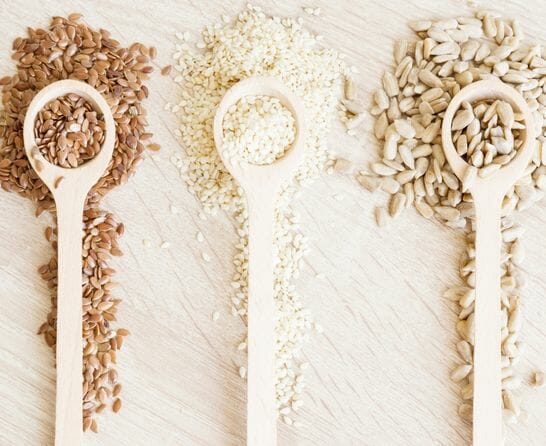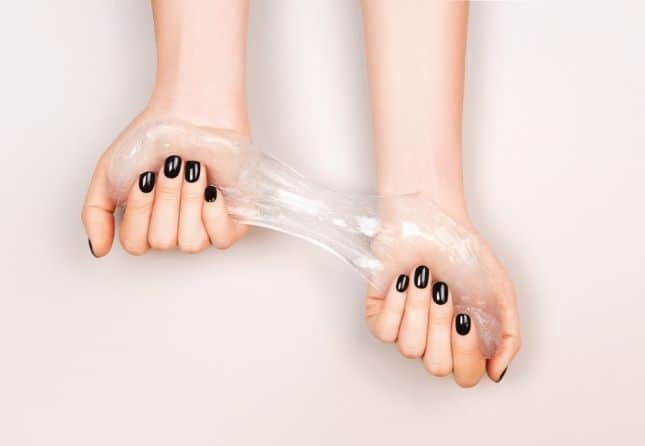Home > Female Body > Menstrual cycle > Seed cycling for hormone balance: Does it work?


Have you heard of seed cycling? Yes, we know it sounds like some sort of hellish spin class, where an overzealous instructor pelts you with seeds while screaming “Feel the burnnn!” But we promise you it’s a very cool, very healthy food thing. Yup, food. Welcome to the magic of seed cycling and what it does for hormone balance.
Of course, if you have heard of seed cycling, then the term might prompt a memory of that Instagrammable smoothie bowl you once tried to order. Acai Bowl? Achigh? Acahi? Either way, it tasted like straw. And the pics were rubbish. But what if we told you these seed-incorporated meals could lead to better hormonal and Menstrual health?
The theory behind the whole thing goes like this: Eating specific types of seeds can help balance Estrogen and Progesterone. Now we use the word theory, as there is very little scientific research about any of it. Although, that’s not a surprise. So, please take this all with a pinch of Flax seed as we can’t guarantee any Menstrual miracles. That said, there are a ton of other scientifically proven reasons to “Eat yo seeds.”
Seed cycling for hormone balance makes the best sense once you’ve got a grasp of two things. And they’re the stages of your Menstrual cycle.
This stage is called the Follicular phase, which starts on the first day of your period. And it keeps going until you release a mature egg during Ovulation, around two weeks later. Your Estrogen levels slowly start to climb on day one, peaking once your egg is free.
The second phase is known as the Luteal and covers the last two weeks of your cycle. During this stage, your Progesterone levels should rise while Estrogen levels fall, as your body prepares for a possible bun.
But as we know gang, hormone balance is a delicate flower, and if things are even slightly off-kilter, it can lead to a whole load of problems. Yep, PMS, acne, irregular cycles, hot flashes, Polycystic Ovaries, the list goes on. And that’s where seeds come in. Allegedly, consuming different seeds during each phase of your cycle can help alleviate those symptoms. And that’s basically seed cycling in a nutshell… Seed shell? You get it.
One of the trickiest things about seed cycling is knowing when those phases start. Perhaps you don’t have periods as often anymore, your cycle is irregular, or you can’t even remember what you had for dinner last night, let alone if it’s the 14th day of your cycle. Whatever the issue, if you struggle to keep up with your cycle, there are a couple of options.
The first is synchronizing seed cycling to the phases of the moon. The start of the new Moon stands in for the Follicular phase, while the full Moon does the same for the Luteal phase.
Now, we know what you’re thinking…. Syncing with the Moon?! What’s next? Will stroking a Unicorn during Ovulation rid me of PMS? You’re right. It does sound a bit witchy woo wah, but lots of women swear by it. So maybe it’s time to channel your inner mystic and give it a go.
On the other hand, the second option is tracking your cycle and symptoms, and getting to know how your Menstrual cycle is working. Which means it’s time for a shameless plug! May we point you in the direction of the awesome Hormona app? It’s a fantastic way to keep a record of what’s going on and when. And that can only help with seed cycling. Speaking of…
Once you’ve got the Follicular and Luteal cycles on lock, seed cycling is actually pretty simple. Each day you consume two tablespoons of seeds. Easy, right? You just alter the types of seeds depending on where you are in your cycle. To whit:
Some hardcore seed cyclers eat the seeds raw and freshly ground. If that sounds like a journey you’re just not ready to take, fair enough. Luckily, there are lots of conveniently delicious ways to incorporate seeds into your diet that don’t include a week of dry mouth.
When it comes to the seeds alone, there are three simple steps to follow:
Now if you don’t fancy grazing on raw seed dust, and we don’t blame you, there are lots of ways you can add them to your diet! Give some of these a whirl:
During the Follicular phase, your Estrogen levels are climbing. Flax and seeds contain phytoestrogens, the plant form of Estrogen, that can help balance your own Estrogen levels. The Zinc found in Pumpkin seeds can help boost your Progesterone levels as you enter the Luteal phase.
Once you’re in the Luteal phase, Sesame seeds and Sunflower seeds are the go-to hormone helpers. The former is a rich source of Zinc, which like Pumpkin seeds, boosts Progesterone levels. They also contain lignans which are compounds that can allegedly stop the overproduction of Estrogen. And Sunflower seeds have high levels of Selenium, which can cleanse the liver of excess Estrogen.
And as if that wasn’t enough, Flax, Pumpkin, Sesame, and Sunflower seeds are all fab sources of Omega 3s which can help to reduce inflammation… See ya cramps!
The jury’s still out on what seed cycling actually does for hormone balance. As of yet, there is no hard scientific evidence to suggest seeds affect hormone production. But that doesn’t necessarily mean it doesn’t have value, just that no one’s really paying that much attention.
Ultimately, it’s unlikely eating seeds alone is going to completely transform your Menstrual health. As regular Hormonas know, we’re all different, and nothing works for everyone. And while there’s no scientific evidence out there to suggest the hormone-related benefits of seed cycling, doing anything that improves your overall health and wellbeing has value.
So, maybe incorporating seeds into your diet for their nutritional value, rather than as a cure to hormone-related problems is the way to go. But if you did want to try seed cycling, the good news is there are no serious risks involved. And you never know, there’s still so much scientific research to be done into natural hormone remedies. This means their magic powers may well be uncovered very soon!
Disclaimer: This website does not provide medical advice. The information, including but not limited to, text, graphics, images and other material contained on this website are for informational purposes only. No material on this site is intended to be a substitute for professional medical advice, diagnosis, or treatment. Always seek the advice of your physician or other qualified healthcare provider with any questions you may have regarding a medical condition or treatment, and before undertaking a new health care regimen, and never disregard professional medical advice or delay in seeking it because of something you’ve read on this website.

-


Dr Singh is the Medical Director of the Indiana Sleep Center. His research and clinical practice focuses on the myriad of sleep.

What vaginal discharge colors mean for your health Understanding vaginal discharge colors and meaning is essential for every woman at every stage of life. While some colored discharge may indicate infections, others are normal. White and clear The first discharge

Understanding perimenopause and menopause When talking about perimenopause versus menopause, it’s easy to confuse these two stages. Perimenopause is the transitional period when you move away from your peak fertility and your ovaries gradually stop releasing eggs. In turn, menstruation

Understanding perimenopause and its symptoms When it comes to aging, many women know about menopause but are surprised to learn about the transitional stage leading up to it, called perimenopause. There are three stages of perimenopause: early, late, and menopause,
| Cookie | Duration | Description |
|---|---|---|
| cookielawinfo-checkbox-analytics | 11 months | This cookie is set by GDPR Cookie Consent plugin. The cookie is used to store the user consent for the cookies in the category "Analytics". |
| cookielawinfo-checkbox-functional | 11 months | The cookie is set by GDPR cookie consent to record the user consent for the cookies in the category "Functional". |
| cookielawinfo-checkbox-necessary | 11 months | This cookie is set by GDPR Cookie Consent plugin. The cookies is used to store the user consent for the cookies in the category "Necessary". |
| cookielawinfo-checkbox-others | 11 months | This cookie is set by GDPR Cookie Consent plugin. The cookie is used to store the user consent for the cookies in the category "Other. |
| cookielawinfo-checkbox-performance | 11 months | This cookie is set by GDPR Cookie Consent plugin. The cookie is used to store the user consent for the cookies in the category "Performance". |
| viewed_cookie_policy | 11 months | The cookie is set by the GDPR Cookie Consent plugin and is used to store whether or not user has consented to the use of cookies. It does not store any personal data. |
